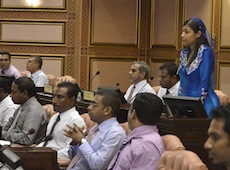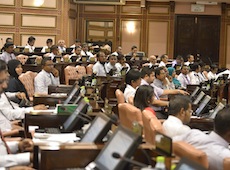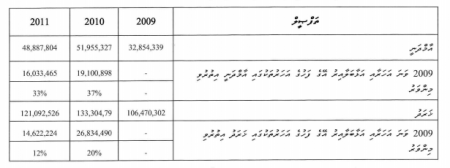Today’s sitting of parliament has been called off by Speaker Abdulla Maseeh after opposition Maldivian Democratic Party (MDP) MPs raised consecutive points of order objecting to the composition of the Majlis’ 13 standing committees.
Adjourning the sitting amid disorder in the chamber, Speaker Maseeh announced that he would “discuss the issue of the standing committees with political party leaders.”
Government-aligned MPs accused the opposition of obstructing proceedings to thwart its legislative agenda.
The standing committees were constituted yesterday by a select committee with the ruling Progressive Party of Maldives (PPM) and coalition partner (MDA) securing a majority on government oversight committees.
The five-member select committee – comprised of a representative from the five political parties in parliament – approved the composition of committees after MDP MP Ibrahim Shareef walked out of yesterday’s committee meeting in protest, contending that the seat allocation was unfair.
The committee’s decision will be put to a vote on the Majlis floor on Monday (June 23).
At the beginning of today’s sitting, Speaker Maseeh gave the floor to MP Rozaina Adam to present legislation on medical negligence ahead of a preliminary debate.
The MDP MP for Addu Meedhoo however declared that she was withdrawing the proposed legislation as there were “no committees in the Majlis to review this bill.”
“And we don’t know when [the standing committees] are going to be formed. So our People’s Majlis is in a state today where we cannot even envisage when the committee is going to be formed and when it would be able to consult relevant authorities and work on the bill,” she said.
 Rozaina said she wished to make changes to the bill after consulting the Medical Association of Maldives, after which it be resubmitted as soon as standing committees are constituted.
Rozaina said she wished to make changes to the bill after consulting the Medical Association of Maldives, after which it be resubmitted as soon as standing committees are constituted.
Speaker Maseeh, however, insisted repeatedly that parliamentary rules allow for the formation of ad hoc or select committees to review legislation.
The report forwarded by the select committee formed to constitute standing committees will be tabled in the agenda for Monday’s sitting, he added.
Standing committees
MP Ibrahim Shareef – who represented the opposition party in the select committee that approved the standing committee composition – contended that the legislative process could not begin in the absence of standing committees.
While the MDP had been willing to compromise on the committee composition, Shareef said the PPM did not want the opposition party to have a voice in parliament or be able to exercise oversight.
The ruling party had begun efforts to “create an autocratic one-party state like we had 30 years ago,” he said.
In the wake of the select committee decision yesterday, Shareef told reporters that the opposition party would be forced to resort to direct action if its MPs were not afforded the opportunity to hold the government accountable through parliament.
Jumhooree Party (JP) MP Ilham Ahmed accused the speaker of stalling as the government had not finished “hunting” for new MPs.
Two JP MPs signed for the PPM yesterday, joining a number of political appointees who have switched to the ruling party in the wake of the termination of the agreement between the former coalition partners.
MPs who leave their party should be “ashamed” of themselves, the JP deputy leader said.
“We will not allow a brutal and autocratic rule. You should believe, we saw two or three MDP working alone courageously,” he said, referring to the MDP MPs’ efforts in the Special Majlis or constitutional assembly convened to revise the constitution.
“We will see that here again. So I don’t believe the Majlis can carry on before committees are formed,” he said.
“Obstruction”
Pro-government MPs meanwhile accused opposition MPs of attempting to stall parliamentary proceedings and obstruct the government.
PPM MP Saud Hussain accused opposition MPs of scheming to disrupt parliament with points of order and prevent debate on government-sponsored legislation.
PPM MP Riyaz Rasheed – chair of the select committee that determined composition of standing committees – urged the  opposition party to resolve disputes peacefully through dialogue.
opposition party to resolve disputes peacefully through dialogue.
“There’s nothing you can make us do by yelling. We should do things peacefully,” he said.
PPM MP Ali Arif argued that the opposition party had no grounds to complain as the party had been granted 39 seats on the standing committees, which reflected the party’s numbers in parliament.
Moreover, he added, the absence of standing committees was not a problem at the moment as preliminary debate had not been completed for any piece of legislation so far.
Former President Mohamed Nasheed meanwhile stated on social media that standing committees should be formed in accordance with “the spirit of the constitution” to allow parliament to hold the executive answerable.
“MDP is the party that represents the whole Maldives. Thanks to MDP MPs,” the opposition leader tweeted.


